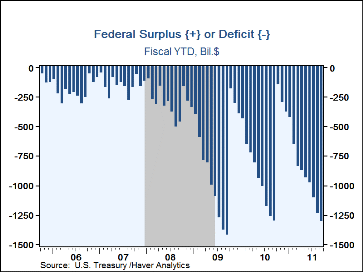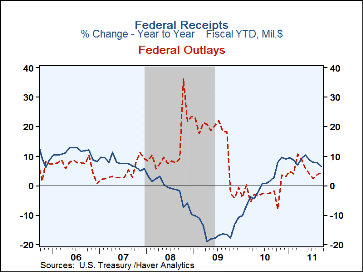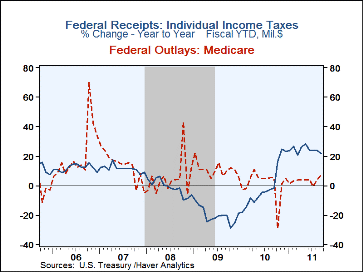 Global| Oct 17 2011
Global| Oct 17 2011U.S. Budget Deficit Remains Roughly Unchanged During FY 2011
by:Tom Moeller
|in:Economy in Brief
Summary
The U.S. Government's budget deficit for all of FY 2011 was $1,298.6B versus $1,294.2B in FY 2010, according to figures released late-Friday by the U.S. Treasury and the Office of Management and Budget. As a percent of GDP the deficit [...]
 The U.S. Government's budget deficit for all of FY 2011 was $1,298.6B
versus $1,294.2B in FY 2010, according to figures released late-Friday by
the U.S. Treasury and the Office of Management and Budget. As a percent of
GDP the deficit also held y/y at 8.7%.
The U.S. Government's budget deficit for all of FY 2011 was $1,298.6B
versus $1,294.2B in FY 2010, according to figures released late-Friday by
the U.S. Treasury and the Office of Management and Budget. As a percent of
GDP the deficit also held y/y at 8.7%.
For FY'11, net-receipts rose 6.5% versus FY'10. The gain was powered by a 21.5% rise in individual income tax payments due to higher employment and longer hours worked. However, greatly weakened growth in profits produced a 5.4% decline in corporate tax payments. Social insurance taxes fell 5.3% due to this year's tax cut.
Reported outlays increased 4.2% led by a 17.3% rise veterans benefits and a 15.7% jump in interest outlays. Medicare outlays rose an increased and strong 7.5%. Growth in social security outlays was steady with a 3.4% rise. Growth in health spending, however, decelerated to 1.0%. Defense outlays also rose a lessened 2.1%.
Haver's basic data on Federal Government outlay and receipts and summary presentations of the Budget from both OMB and CBO are contained in USECON. Considerable detail is given in the separate GOVFIN database.
The Central Question for Health Policy in Deficit Reduction from the New England Journal of Medicine is available here.
| US Government Finance | % of Total | FY 2011 | FY 2010 | FY 2009 | FY 2008 |
|---|---|---|---|---|---|
| Budget Balance | $-1,298.6 | $-1,294.2B | $-1,415.7B | $-454.8B | |
| As a percent of GDP | 8.7 | 8.9 | 10.2 | 3.2 | |
| Net Revenues (Y/Y % Change) | 100 | 6.5 | 2.7 | -16.6 | -1.7 |
| Individual Income Taxes | 47 | 21.5 | -1.8 | -20.1 | -1.5 |
| Corporate Income Taxes | 8 | -5.4 | 38.5 | -54.6 | -17.8 |
| Social Insurance Taxes | 36 | -5.3 | -2.9 | -1.0 | 3.5 |
| Excise Taxes | 3 | 8.2 | 7.1 | -7.2 | 3.5 |
| Miscellaneous | 4 | 6.2 | 86.2 | 3.7 | 5.1 |
| Net Outlays (Y/Y % Change) | 100 | 4.2 | -1.8 | 18.2 | 9.1 |
| Nat'l Defense | 20 | 2.1 | 4.6 | 7.6 | 11.8 |
| Health | 10 | 1.0 | 10.4 | 19.1 | 5.4 |
| Medicare | 20 | 7.5 | 5.0 | 10.1 | 4.1 |
| Income Security | 17 | -3.3 | 16.7 | 24.9 | 16.8 |
| Social Security | 20 | 3.4 | 3.5 | 10.7 | 5.3 |
| Veterans Benefits | 4 | 17.3 | 13.6 | 12.7 | 16.3 |
| Interest | 6 | 15.7 | 2.9 | -24.6 | 6.3 |
Tom Moeller
AuthorMore in Author Profile »Prior to joining Haver Analytics in 2000, Mr. Moeller worked as the Economist at Chancellor Capital Management from 1985 to 1999. There, he developed comprehensive economic forecasts and interpreted economic data for equity and fixed income portfolio managers. Also at Chancellor, Mr. Moeller worked as an equity analyst and was responsible for researching and rating companies in the economically sensitive automobile and housing industries for investment in Chancellor’s equity portfolio. Prior to joining Chancellor, Mr. Moeller was an Economist at Citibank from 1979 to 1984. He also analyzed pricing behavior in the metals industry for the Council on Wage and Price Stability in Washington, D.C. In 1999, Mr. Moeller received the award for most accurate forecast from the Forecasters' Club of New York. From 1990 to 1992 he was President of the New York Association for Business Economists. Mr. Moeller earned an M.B.A. in Finance from Fordham University, where he graduated in 1987. He holds a Bachelor of Arts in Economics from George Washington University.
More Economy in Brief
 Global| Feb 05 2026
Global| Feb 05 2026Charts of the Week: Balanced Policy, Resilient Data and AI Narratives
by:Andrew Cates








